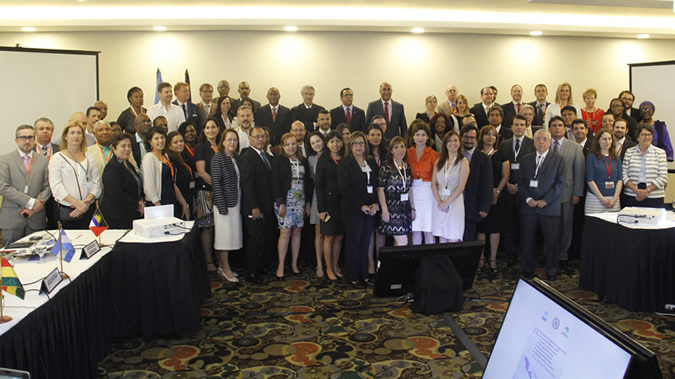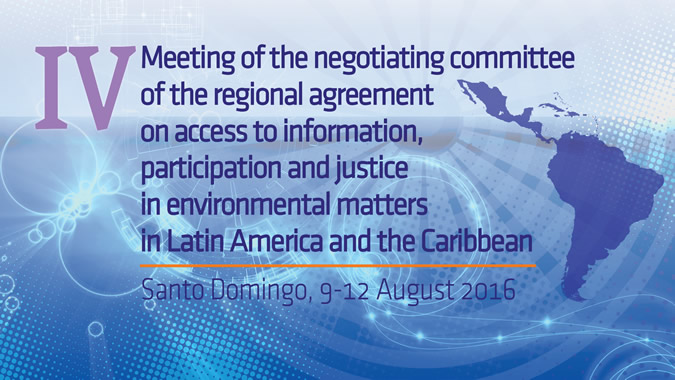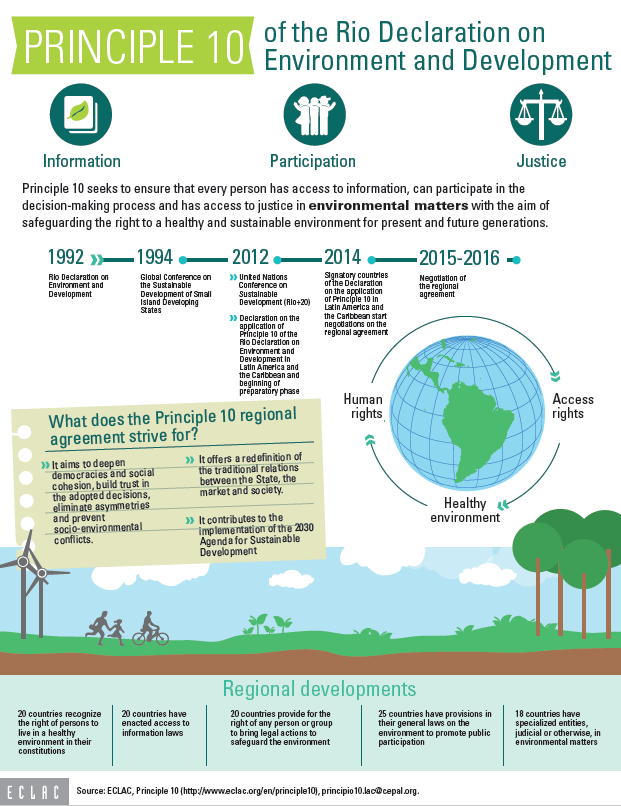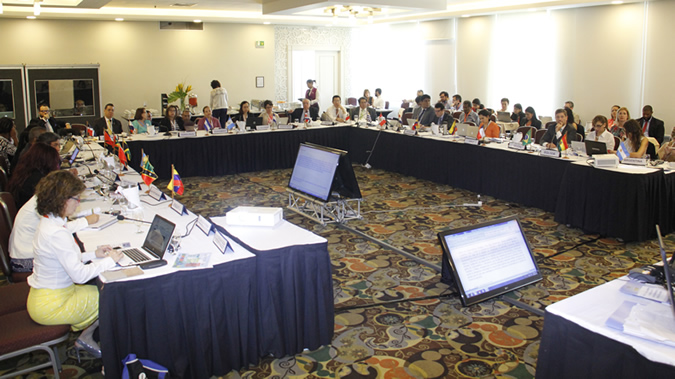Latin American and Caribbean Countries Boost Progress towards a Regional Agreement on Environmental Matters
Work area(s)
The fourth meeting of the negotiating committee on Principle 10 of the Rio Declaration on Environment and Development began today in the Dominican Republic.

Delegates from 22 Latin American and Caribbean countries to have signed the Declaration on the application of Principle 10 of the Rio Declaration on Environment and Development - concerning access to information, public participation and justice in environmental matters - today began a four day meeting in Santo Domingo, Dominican Republic, to boost negotiations of a regional agreement.
The fourth meeting of the Negotiating Committee for the Regional Agreement on Access to Information, Public Participation and Justice in Environmental Matters in Latin America and the Caribbean is being organized by the Economic Commission for Latin America and the Caribbean (ECLAC) and the Government of the Dominican Republic (through the Ministry of Foreign Affairs (MIREX) and the Ministry for the Environment and Natural Resources).
The opening session was attended by Bautista Rojas, Minister for the Environment and Natural Resources of the Dominican Republic; Patricia Abreu, Vice-Minister for Cooperation and International Affairs in the same Ministry; Joseluis Samaniego, Director of the ECLAC Division for Sustainable Development and Human Settlements; Dolores María Duverges, Undersecretary for Environmental Management and Planning of Territory, from the Argentine Ministry for the Environment and Sustainable Development (representing the Presiding Officers); Natalia Gómez and Euren Cuevas, representatives from the public; and Andrés Navarro, Foreign Affairs Minister of the Dominican Republic.
Minister Bautista Rojas stated that holding the fourth meeting in Santo Domingo was yet another demonstration of the tireless daily efforts of the Dominican Republic to strengthen and bolster existing regulations in conjunction with the various key sectors and actors in environmental matters, as well as showing the importance of the application of Principle 10 of the Rio Declaration in striking the right balance between environmental requirements and realities and the need of the region’s peoples for progress.
Joseluis Samaniego called on countries to participate in negotiating a future regional agreement on access to information, public participation and justice in environmental matters with the ambition, responsibility and sense of urgency that the subject requires. He referred to the deep economic, social and environmental imbalances affecting the region today by stating that the prevailing style of development in Latin America and the Caribbean was clearly unsustainable.
He added that this process was a clear example that the region’s countries could adopt a concerted, autonomous, progressive and cooperative approach to build capacities, tackle global challenges and strengthen environmental governance by contributing to economic and social progress as well as environmental sustainability.
On behalf of the Presiding Officers of the negotiation process, Dolores María Duverges said that it was a great opportunity for discussion and moving forward with the regional agreement. Referring to the 2030 Agenda for Sustainable Development and its 17 Goals (SDGs) approved by all United Nations member countries in 2015, she pointed out that many of the SDGs related to the environment and that Principle 10 was therefore closely linked to achieving that Agenda. That was why progress on this agreement on Principle 10 represented progress towards the 2030 Agenda.
Public representatives Natalia Gómez and Euren Cuevas highlighted the serious environmental challenges facing the region, and declared that this negotiation process demanded high standards of information, participation mechanisms and access to justice.
They affirmed that the Principle 10 negotiations show that dialogue was the only path to sustainable development. Latin America and the Caribbean had a growing number of projects that affect people and their communities. There was a need for a solid and robust regional agreement to strengthen public participation mechanisms and to be inclusive enough to involve every person regardless of race, language or status.
The Foreign Affairs Minister of the Dominican Republic, Andrés Navarro, stressed that climate change is not about shaping the future, but rather the damage can already be seen here and now.
He said it was not enough to have effective public policies that were based on legislation alone. Inclusive policies had to be formulated from the outset with civil society (and organizations representing it).
At the end of the opening session, the representative from Saint Kitts and Nevis, Eden Alistair Edwards, (Permanent Secretary for Agriculture, Marine Resources, Cooperatives, Environment and Human Settlements) reported that his country was endorsing the regional declaration on the application of Principle 10 in Latin America and the Caribbean. This was welcomed by the other nations participating in the process.
ECLAC acts as technical secretariat for the negotiation of a regional agreement on Principle 10, which is expected to conclude in December 2016.
Related content

Fourth Round of Negotiations for Agreement on the Application of Principle 10 in Environmental Matters Will Be Held in Dominican Republic
Meeting to make progress to reach a regional instrument on rights of access to information, public participation and justice in environmental matters will be held on August 9-12 in Santo Domingo.

More Citizenship for Sustainable Development
Op-ed by Alicia Bárcena, ECLAC’s Executive Secretary, and Carlos de Miguel, Head of the Policies for Sustainable Development Unit of the Sustainable Development and Human Settlements Division of…

Principle 10 of the Rio Declaration on Environment and Development
Principle 10 seeks to ensure that every person has access to information, can participate in the decision-making process and has access to justice in environmental matters with the aim of…

Santiago, Chile, will Host New Round of Negotiations for Regional Agreement on Rights of Access in Environmental Matters
In the Dominican Republic, delegates from 22 Latin American and Caribbean countries closed the Fourth meeting of the negotiating committee on Principle 10 of the Rio Declaration on Environment and…
Subregional headquarter(s) and office(s)
Related link(s)
Country(ies)
- Latin America and the Caribbean
-
Dominican Republic
Contact
Public Information Unit
- prensa@cepal.org
- (56 2) 2210 2040